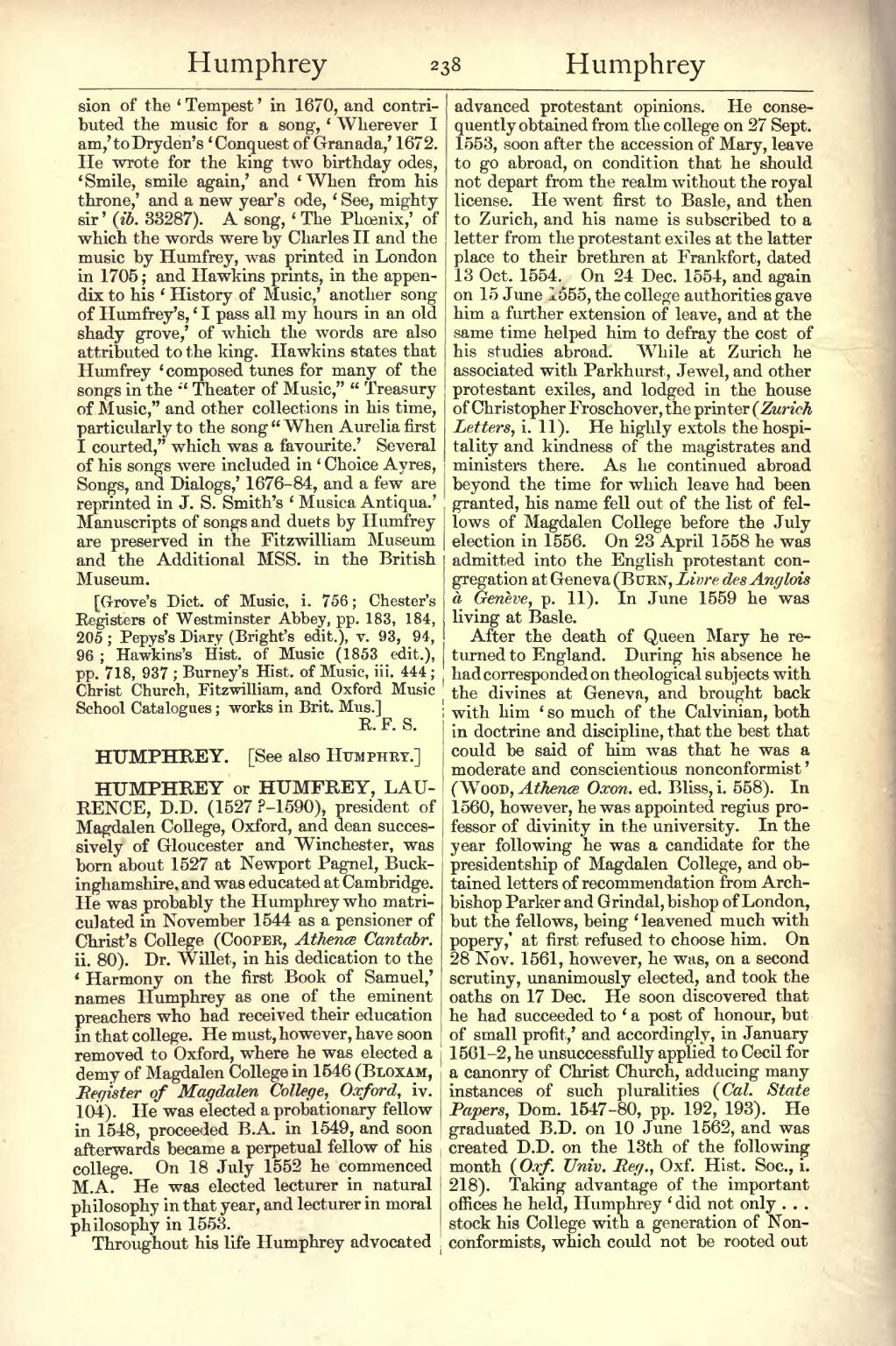sion of the 'Tempest' in 1670, and contributed the music for a song, 'Wherever I am,' to Dryden's 'Conquest of Granada,' 1672. He wrote for the king two birthday odes, 'Smile, smile again,' and 'When from his throne,' and a new year's ode, 'See, mighty sir' (ib. 33287). A song, 'The Phoenix,' of which the words were by Charles II and the music by Humfrey, was printed in London in 1705; and Hawkins prints, in the appendix to his 'History of Music,' another song of Humfrey's, 'I pass all my hours in an old shady grove,' of which the words are also attributed to the king. Hawkins states that Humfrey 'composed tunes for many of the songs in the "Theater of Music," "Treasury of Music," and other collections in his time, particularly to the song "When Aurelia first I courted," which was a favourite.' Several of his songs were included in `Choice Ayres, Songs, and Dialogs,' 1676-84, and a few are reprinted in J. S. Smith's 'Musica Antiqua.' Manuscripts of songs and duets by Humfrey are preserved in the Fitzwilliam Museum and the Additional MSS. in the British Museum.
[Grove's Dict. of Music, i. 756; Chester's Registers of Westminster Abbey, pp. 183, 184, 205; Pepys's Diary (Bright's edit.), v. 93, 94, 96; Hawkins's Hist. of Music (1853 edit.), pp.718, 937; Burney's Hist. of Music, iii. 444; Christ Church, Fitzwilliam, and Oxford Music School Catalogues; works in Brit. Mus.]
HUMPHREY. [See also Humphry.]
HUMPHREY or HUMFREY, LAURENCE, D.D. (1527?–1590), president of Magdalen College, Oxford, and dean successively of Gloucester and Winchester, was born about 1527 at Newport Pagnel, Buckinghamshire, and was educated at Cambridge. He was probably the Humphrey who matriculated in November 1544 as a pensioner of Christ's College (Cooper, Athenæ Cantabr. ii. 80). Dr. Willet, in his dedication to the `Harmony on the first Book of Samuel,' names Humphrey as one of the eminent preachers who had received their education in that college. He must, however, have soon removed to Oxford, where he was elected a demy of Magdalen College in 1546 (Bloxam, Register of Magdalen College, Oxford, iv. 104). He was elected a probationary fellow in 1548, proceeded B.A. in 1549, and soon afterwards became a perpetual fellow of his college. On 18 July 1552 he commenced M.A. He was elected lecturer in natural philosophy in that year, and lecturer in moral philosophy in 1553.
Throughout his life Humphrey advocated advanced protestant opinions. He consequently obtained from the college on 27 Sept. 1553, soon after the accession of Mary, leave to go abroad, on condition that he should not depart from the realm without the royal license. He went first to Basle, and then to Zurich, and his name is subscribed to a letter from the protestant exiles at the latter place to their brethren at Frankfort, dated 13 Oct. 1554. On 24 Dec. 1554, and again on 15 June 1555, the college authorities gave him a further extension of leave, and at the same time helped him to defray the cost of his studies abroad. While at Zurich he associated with Parkhurst, Jewel, and other protestant exiles, and lodged in the house of Christopher Froschover, the printer (Zurich Letters, i. 11). He highly extols the hospitality and kindness of the magistrates and ministers there. As he continued abroad beyond the time for which leave had been granted, his name fell out of the list of fellows of Magdalen College before the July election in 1556. On 23 April 1558 he was admitted into the English protestant congregation at Geneva (Burn, Livre des Anglois à Genève, p. 11). In June 1559 he was living at Basle.
After the death of Queen Mary he returned to England. During his absence he had corresponded on theological subjects with the divines at Geneva, and brought back with him 'so much of the Calvinian, both in doctrine and discipline, that the best that could be said of him was that he was a moderate and conscientious nonconformist' (Wood, Athenæ Oxon. ed. Bliss, i. 558). In 1560, however, he was appointed regius professor of divinity in the university. In the year following he was a candidate for the presidentship of Magdalen College, and obtained letters of recommendation from Archbishop Parker and Grindal, bishop of London, but the fellows, being 'leavened much with popery,' at first refused to choose him. On 28 Nov. 1561, however, he was, on a second scrutiny, unanimously elected, and took the oaths on 17 Dec. He soon discovered that he had succeeded to 'a post of honour, but of small profit,' and accordingly, in January 1561-2, he unsuccessfully applied to Cecil for a canonry of Christ Church, adducing many instances of such pluralities (Cal. State papers, Dom. 1547-80, pp. 192, 193). He graduated B.D. on 10 June 1562, and was created D.D. on the 13th of the following month (Oxf. Univ. Reg., Oxf. Hist. Soc., i. 218). Taking advantage of the important offices he held, Humphrey 'did not only … stock his College with a generation of Nonconformists, which could not be rooted out
